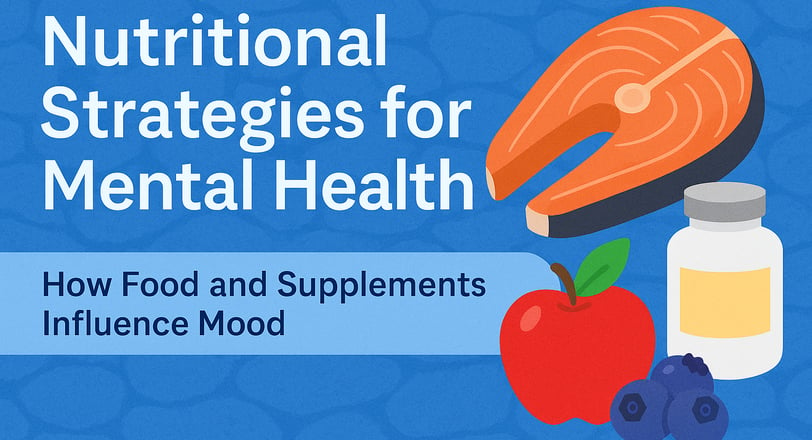Nutritional Strategies for Mental Health: How Food and Supplements Influence Mood
Discover how diet and targeted supplements can support mental health, reduce anxiety, and improve mood. Backed by research and expert insights, this guide breaks down what to eat and which Amazon products can help.
5/15/20253 min read


Nutritional Strategies for Mental Health
Introduction
While diet is widely accepted as a key to physical health, its role in mental well-being—especially in managing anxiety, depression, and mood swings—is only just beginning to receive the attention it deserves. Recent research in nutritional psychiatry reveals that the nutrients we consume can influence neurotransmitter activity, reduce inflammation, and even modulate the gut-brain axis. This article breaks down the science and offers practical, evidence-based strategies—along with three Amazon-tested tools—to help you eat for better mental health.
1. How Nutrition Affects the Mind
Neurotransmitter Precursors: Amino acids like tryptophan (found in turkey, oats, and seeds) are precursors to serotonin. Without sufficient intake, neurotransmitter production slows down, leading to mood drops.
Inflammation & Oxidative Stress: Chronic low-grade inflammation is now considered a root cause of depression. Antioxidants (found in berries, leafy greens, and spices like turmeric) reduce free radical damage and promote cognitive stability.
Gut–Brain Axis: With over 90% of serotonin produced in the gut, your microbiome plays a massive role in regulating stress and mood. Fermented foods like yogurt, kimchi, and kefir can help—but certain supplements may go deeper.
2. Research-Backed Insights
One of the most well-known studies in this space is the SMILES trial, which showed that a Mediterranean-style diet rich in vegetables, legumes, whole grains, and omega-3s significantly improved symptoms in patients with major depression.
Other studies show that people with low intakes of magnesium, zinc, and B vitamins are more likely to report high stress and poor mood regulation. Likewise, probiotic supplementation has been shown to affect GABA production, lowering anxiety and promoting relaxation.
-Qunol Magnesium L-Threonate
Brain-Calming Mineral Support
Magnesium plays a key role in nerve transmission and stress response. This particular form, magnesium L-threonate, is one of the few that crosses the blood-brain barrier effectively.
Why it fits here: It supports both relaxation and cognitive clarity, especially for those who deal with anxiety, brain fog, or trouble sleeping.
When to use it: Best taken in the evening or before bed to promote calm and better mental recovery.
Bonus: Also supports memory and attention span, according to early-stage research.
3. Expert Opinions: What the Pros Say
Dr. Felice Jacka, a pioneer in nutritional psychiatry, emphasizes that mental health interventions should begin with the plate. Her team found that simply improving diet quality can lower the risk of developing depression by 30%.
Meanwhile, Dr. Julia Rucklidge, a clinical psychologist from New Zealand, has run trials showing that broad-spectrum micronutrient supplements improve mood resilience and emotional regulation, especially following stressful events.
4. Real-World Application
Step 1: Focus on Nutrient Density
Protein: Supports neurotransmitter formation (turkey, tofu, legumes)
Omega-3 fats: Reduce inflammation and support cell membrane function (wild salmon, flax, walnuts)
Antioxidants: Defend against oxidative stress (berries, leafy greens, dark chocolate)
Step 2: Balance Blood Sugar
Skipping meals or eating refined carbs alone can cause glucose dips, which mimic anxiety. Aim for balanced meals every 4–5 hours that include protein, fiber, and healthy fats.
Step 3: Add Strategic Supplements (If Needed)
While food should always come first, targeted supplements can help bridge gaps, especially during periods of high stress or low appetite.
-ONNIT Alpha Brain
Clinically Studied Nootropic for Focus & Mood
This nootropic blend includes L-theanine, Bacopa monnieri, and vitamin B6, all of which are linked to improved mental clarity and emotional regulation.
Why it fits here: Alpha Brain is ideal for people juggling work stress, mental fatigue, or focus struggles. It supports neurotransmitter activity while staying caffeine-free.
When to use it: Ideal in the morning or early afternoon for a clean mental boost without the crash.
Bonus: Backed by double-blind, placebo-controlled trials for cognitive performance.
5. The Gut–Brain Connection (Expanded)
The connection between your microbiome and mood is now one of the hottest areas in mental health research. Gut bacteria interact with the vagus nerve, influence the immune system, and even impact how your brain responds to stress.
While fermented foods can help, medicinal mushrooms are now being studied for their prebiotic and neurotrophic effects—particularly lion’s mane, which has shown promise in boosting mood and nerve regeneration.
-Host Defense Lion’s Mane Capsules
Mood & Memory Mushroom
This adaptogenic mushroom supports nerve growth factor (NGF) production, helping with brain plasticity and emotional stability.
Why it fits here: Lion’s Mane supports a healthier gut-brain relationship and has shown early promise in reducing mild depressive symptoms.
When to use it: Take daily with breakfast as part of a holistic routine.
Bonus: Also promotes focus and immune health, making it a solid daily addition.
Conclusion: Building Your Strategy
Nutrition may not replace therapy or medication, but it’s a powerful foundation for improving mental resilience. Whether you’re trying to lift your baseline mood, reduce anxiety, or recover from stress, the right dietary approach can help rewire your brain from the inside out.
Action Steps:
Prioritize nutrient-dense foods—especially omega-3s, fiber, protein, and colorful vegetables.
Stabilize blood sugar with regular, balanced meals.
Consider high-quality supplements like:
Qunol Magnesium L-Threonate for calm and clarity
ONNIT Alpha Brain for focus and mood support
Host Defense Lion’s Mane for neuroplasticity and gut-brain health
Track how your body responds and always consult a healthcare professional when introducing new supplements—especially alongside medications.
FITNESS
Nutrition
WellnesS
info@movebetterco.com
© 2025. All rights reserved | Privacy Policy | Terms & Conditions